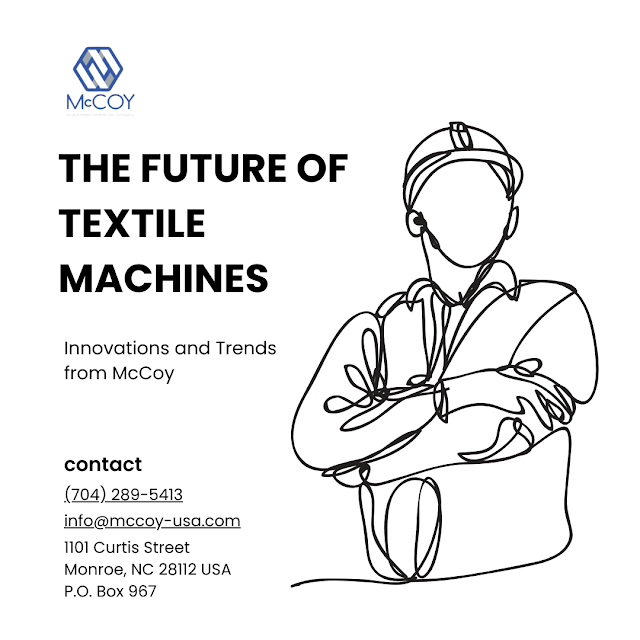The Future of Textile Machines: Innovations and Trends from McCoy
The textile industry is undergoing a significant transformation, driven by technological advancements, sustainability initiatives, and the integration of automation. At the forefront of this evolution is McCoy Machinery Company, Inc., a leader in American textile machinery, renowned for its innovative solutions in textile machines and fiber handling equipment. This article delves into the future of textile machines, highlighting the latest trends and McCoy's pivotal role in shaping the industry's landscape.
1. The Evolution of Textile Machines
Textile machines have come a long way from manual looms to sophisticated automated systems. The 20th century witnessed the introduction of automation technologies such as automatic looms and shuttleless weaving machines, reducing the need for manual labor and increasing productivity. In the 21st century, automation has truly revolutionized textile production, leading to more efficient, safe, and high-quality production environments.
2. Current Trends Shaping the Textile Machinery Industry
-
Digitalization and Industry 4.0: The integration of digital technologies into textile machines has enabled real-time monitoring, predictive maintenance, and enhanced production efficiency. Industry 4.0 principles are being applied to create smart factories where machines communicate seamlessly, leading to optimized operations.
-
Sustainability Initiatives: Environmental concerns are pushing the industry towards sustainable practices. Innovations in textile machinery now focus on reducing waste, conserving energy, and utilizing eco-friendly materials. These sustainable approaches not only benefit the environment but also enhance brand reputation and meet consumer demand for green products.
-
Automation and Robotics: The adoption of automation and robotics in textile production has led to increased precision and reduced labor costs. Automated systems handle complex tasks such as fabric cutting, sewing, and quality inspection, ensuring consistent product quality and faster production cycles.
-
Advanced Materials and Smart Textiles: The development of smart textiles and the use of advanced materials like carbon fiber have opened new avenues in textile applications. Textile machines are now equipped to handle these materials, enabling the production of fabrics with enhanced functionalities, such as conductivity and responsiveness to environmental stimuli.
3. McCoy's Innovations in Textile Machinery
McCoy Machinery Company, Inc. has been instrumental in driving innovation within the textile machinery sector. Their commitment to excellence is evident in their diverse range of products designed to meet the evolving needs of the industry.
-
Fiber Handling Equipment: McCoy's fiber handling equipment is engineered for precision and efficiency, ensuring consistent textile quality. These systems are crucial for processes involving delicate fibers, maintaining integrity throughout production.
-
Composite Creels: Recognizing the growing demand for advanced materials, McCoy offers composite creels tailored for carbon fiber and fiberglass applications. These creels are designed to handle high-tension materials, ensuring smooth unwinding and minimal breakage, which is essential for high-quality composite production.
-
High-Speed Direct Warping Machines: To meet the industry's need for speed and efficiency, McCoy has developed high-speed direct warping machines. These machines are designed for rapid preparation of warps, reducing downtime and increasing loom efficiency.
-
Custom Creel Solutions: Understanding that each textile operation has unique requirements, McCoy provides custom creel solutions. These tailored systems ensure optimal performance, accommodating specific material types, tension requirements, and space constraints.
4. The Impact of McCoy's Innovations on the Industry
McCoy's advancements have had a profound impact on textile production processes:
-
Enhanced Productivity: The integration of automation and high-speed machinery has significantly increased production rates, allowing manufacturers to meet growing market demands efficiently.
-
Improved Quality: Precision engineering in McCoy's equipment ensures consistent product quality, reducing defects and enhancing customer satisfaction.
-
Sustainability: By focusing on energy-efficient designs and reducing material waste, McCoy's machines contribute to more sustainable manufacturing practices, aligning with global environmental goals.
5. Future Outlook: What's Next for Textile Machines?
The future of textile machinery is poised for further advancements:
-
Integration of Artificial Intelligence (AI): AI is set to revolutionize textile production by enabling predictive maintenance, optimizing production schedules, and enhancing quality control through real-time data analysis.
-
Development of Smart Textiles: Machines capable of producing smart textiles with embedded sensors and interactive features will open new markets and applications, particularly in healthcare and sports industries.
-
Sustainable Manufacturing: Continuous innovation in machinery that supports eco-friendly practices will be crucial. This includes machines designed for recycling textiles and utilizing renewable energy sources.
6. Conclusion
The textile industry stands on the cusp of a technological renaissance, with machinery playing a pivotal role in shaping its future. McCoy Machinery Company, Inc. exemplifies innovation in American textile machinery, offering advanced solutions that enhance productivity, quality, and sustainability. As trends like digitalization, automation, and the use of advanced materials continue to evolve, McCoy's commitment to excellence ensures that they will remain at the forefront, driving the industry towards a dynamic and prosperous future.
For more information on McCoy's innovative
.png)
.png)
.png)
.png)
Comments
Post a Comment